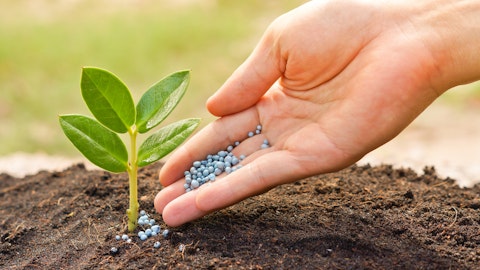In this article, we take a look at the 10 biggest issues in the world and the companies working on solving them. You can skip our detailed analysis of the plight of the world and go directly to 5 Biggest Issues in the World and The Companies Working on Solving Them.
The world is currently going through several crises, most of which are exacerbating each other. On November 15, 2022, the world population hit 8 billion people. All other things constant, it is expected to reach 10 billion people in 2050, according to UN forecasts.
Growing population means more resource consumption. As economic growth around the world leads to rising living standards, consumption is expected to skyrocket. The UN International Resources Panel estimates that resource-use per person in 2050 will be 75% higher than it is today.
Even in the present day, humanity is consuming resources 1.8 times faster than Earth’s biocapacity can regenerate, according to Overshoot Today. The ecological footprint of an average American is 8.1 Global Hectares (gha) per person, while Earth’s biocapacity is only 1.6 gha per person. If everyone consumed like the average American, we would need 5 Earths.
A landmark MIT study done in 1972 accounted for interacting variables such as natural resources, population growth rate, food production/supply, industrial output, and pollution, in a system-dynamics computer model and showed that our default business-as-usual trajectory leads to overshoot and global system collapse somewhere in the mid-21st century. The data from 38 years since the study confirmed its findings in another study done in 2020.
These are stark problems and have created demand for technological solutions, which is where the free market comes in to respond. Many established, as well as startup companies are attempting to solve these problems.
For instance, climate change has resulted in the emergence of the carbon-capture industry (because we’re also destroying the natural carbon sinks, forests) made up of companies attempting to develop efficient and scalable carbon-capture technologies. Notable among these are Aker Carbon Capture ASA (OSLO:ACC.OL) and Carbfix. While some companies are actively trying to solve climate change, others like Amazon.com, Inc. (NASDAQ:AMZN), Alphabet Inc. (NASDAQ:GOOG) and Microsoft Corporation (NASDAQ:MSFT) are doing so passively, by adopting climate-friendly policies.
Now that we understand the background, let’s move on to the list of 10 biggest issues in the world and the companies working on solving them.

Photo by OCG Saving The Ocean on Unsplash
Our Methodology
For our list of the 10 biggest issues in the world and the companies working on solving them, we’ve consulted the UN’s Global-Issues list, and selected the ones that are the most globally consequential. For companies trying to solve them, we’ve used data from various forward-focused media organizations like The Verge, Tech Crunch, Gizmodo and Mashable.
10. Gender Equality
Gender disparity is still among the biggest issues in the world in 21st century, especially in the global south. Most of it results from the gender roles assigned to both biological sexes, where women get the worse end of the bargain.
According to data from UNICEF, girls aged 10-14 are twice as likely to spend an average of 21 hours per week on household tasks than boys of the same age worldwide.
The world is also missing out on the full potential of one-half of its population. The ILO report on gender gap in employment shows women represent only 47% of the workforce around the world while men make up 72% of it as of 2022.
Many large market-cap companies like Alphabet Inc. (NASDAQ:GOOG), Microsoft Corporation (NASDAQ:MSFT) and Amazon.com, Inc. (NASDAQ:AMZN) are taking the initiative in gender inclusion and hiring more and more women for gender equity.
An AI startup, called Pipeline, has also been one of the companies working on solving the issue. It has been making headlines for developing algorithms that help HR departments avoid hiring patterns which are systematically biased against intersectional female gender.
9. Misinformation
Misinformation is one of the most pressing problems of the 21st century. It is having a corrosive effect on democracies and institutional trust, not only in the developing world but in the developed world as well, and leading to a rise in populism.
Misinformation is also central to the present-day disdain for expertise. Its most recent example in the US was the response to the pandemic from some sections of the society.
A significant number of people believed that pandemic lockdowns and vaccination were an excuse for “globalists” to take control of the society and microchip people for surveillance. A survey conducted by YouGov in collaboration with The Economist showed that one in five Americans held this belief.
Misinformation spreads much faster through digital and social media platforms, which is why many digital technology companies like Meta Platforms, Inc. (NASDAQ:META), ByteDance and Alphabet Inc. (NASDAQ:GOOG) have introduced various methods to detect and remove misinformation from their products’ platforms.
8. Wealth Inequality
Wealth inequality between countries, and between individuals within countries are among the biggest issues in the world. In terms of wealth inequality between individuals, the richest global 1% own 46% of the global wealth according to Inequality.org.
For perspective, in 2018, it only took 26 billionaires to hold as much wealth as the bottom 50% of the entire world. High income inequality has been found to be linked with increased risk of economic instability and financial crises. Further, in developed nations, life expectancy and levels of physical health are often lower due to income inequality.
Many startups have started to emerge that are working on solving the problem. One such startup is Pioneer. Its solution to wealth inequality is entrepreneurship. It hosts a sizable online competition every month where people present their projects like startups, books and research projects.
These projects can be digitally voted for, by other members, adding points for advancement. Projects with highest points are evaluated at the end of the month and a dozen or so are selected for funding, backed by Marc Andreessen.
7. Health
Global health is in crisis, especially in the developing world, due to lack of proper medical resources, hygiene and socio-political issues. Apart from these two factors, many diseases have been wreaking havoc without a cure. Cancer, for instance, takes 1 out of 6 lives in the world every year, according to Webmd.com.
In parts of the world like Africa, the threat of another viral outbreak is ever present. The two recent outbreaks, of Ebola Virus and Zika Virus, occurred in 2013 and 2015, respectively, contributing to a 63% increase in zoonotic diseases on the continent from 2012-2022, according to WHO.
The Covid-19 outbreak, which has claimed nearly 7 million lives as of 2022, also showed the world how unprepared it is to deal with outbreaks of airborne viruses, despite their statistical inevitability.
Many companies are working to tackle the rising threat of global health crises. These include Merck & Co., Inc. (NYSE:MRK), Pfizer Inc. (NYSE:PFE) and Novo Nordisk A/S (NYSE:NVO). Merck & Co., Inc. (NYSE:MRK) is known for developing Ervebo, the vaccine for Ebola Virus that contained its spread. Pfizer Inc. (NYSE:PFE) is known for its contribution to the Pfizer-BioNTech vaccine, the first vaccine to roll out for Covid-19.
6. Poverty
Extreme poverty is one of the biggest humanitarian issues in the world. According to World Vision, around 9.2% of the global population lives in extreme poverty, and make less than $1.90 a day.
A number of startup companies have emerged as of late to alleviate suffering caused by poverty. One such startup is Unhoused.org. It is a London-based retailer that sells items like clothes, dental kits, and other consumer products. For every product it sells, it donates the same to an organization helping the homeless community.
Another startup, known as Wagestream, lets the workers of companies which are subscribed to it, tap into their incomes at any time of the month so they can accommodate their ongoing needs. The company has received significant investment from people like Jeff Bezos, the founder of Amazon.com, Inc. (NASDAQ:AMZN).
Companies like Alphabet Inc. (NASDAQ:GOOG) and Microsoft Corporation (NASDAQ:MSFT) have also significantly contributed to tackling extreme poverty. Google has contributed $50 million to the global education project and $50 million to the economic opportunity initiative in the battle against extreme poverty.
Click to continue reading and see 5 Biggest Issues in the World and The Companies Working on Solving Them.
Suggested articles:
- Billionaire Ray Dalio’s 10 Long-Term Stock Picks
- 10 Pump and Dump Stocks Hedge Funds Like
- 12 Best Affordable Energy Stocks to Buy Now
Disclosure: none. 10 Biggest Issues in the World and The Companies Working on Solving Them is originally published on Insider Monkey.





